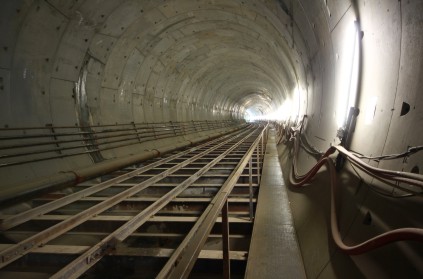Democrat April-May 2000 (Number 43)
Crossrail for London
the train stops here
by our own transport correspondent - Miles N Miles

The Tory government, which was finally brought down
in the last General Election, has created a monster in the shape of
Railtrack. Its existence is purely thanks to European Directive 440
which states that national railway infrastructure must be divorced
from the train operations that use it.The idea is that this private
monopoly is given the task of maintaining the track and signalling,
stations and depots, whilst private competing train companies slug
it out in competition with each other.
Of course, they all have to
use Railtrack metals, for which they pay a track access charge, so
Railtrack itself is a monopoly. There are one or two exceptions to
this: these are relatively small, integral rail networks, onto which
competition does not go, and would seem to lie outside the scope of
the directive.
Transport in London
Back in 1989, London Transport and British Rail as
they were then, put up a scheme for consultation called Crossrail.
This enlightened title was the label for a rail scheme which would
punch a tunnel under London from west to east, thus cutting huge amounts
off cross-London journeys, and relieving congestion on parallel London
Underground lines.
When investing in train services of this magnitude,
it is always best to start from scratch, but here lay the problem:
digging new tunnels is very expensive. Try as they might, the promoters
of Crossrail could not make their project pass through crucial funding
hoops, and despite the great publicity it had received, the project
was quietly shelved. Much work has already been done towards its design.
But of course the grand concepts of fast flow stations, large gauge
tunnels to take double-decker trains, and even one of the planned
station sites, had been cut to try and make the scheme pay. Railtrack
was not given a remit to proceed with the scheme, but they had other
ideas, as we shall see.
Finger of Brussels
Meanwhile, the new Labour government has inherited one of those sticky political problems that were created by funding rules dictated by Brussels. London Underground Limited (LUL), a publicly owned concern, was hitting the headlines because of lack of investment in the main network, while at the same time work was running late on its showpiece Jubilee Line extensions. Since Labour was committed to the same spending rules as the outgoing government, it could not just give money to LUL to spend as it saw fit. Indeed, there seemed to be no new funding at all, so LUL had to take drastic measures to find savings on the main network in order to avoid getting behind on its Jubilee line contracts.
PPP
The magic solution that Labour has come up with, is PPP, or Public-Private Partnerships. This is privatisation under another name of course, and in LUL's case means handing over its infrastructure to three private companies who will take charge of the investment. These companies will be able to recoup this money by charging leasing and track access charges. One of these private companies is Railtrack, who will be given the almost main line gauge Metropolitan, District and Circle lines to look after. Imagine, thought Railtrack, we could get our hands on this and sell even more train paths to our main line customers? Never mind the existing customers on these lines, Railtrack would get a working Crossrail alternative for next to nothing!
City
The City of London is home to one of the largest concentrations of money in the world. One of the Merchant Banks which lives there has made a new case for building Crossrail, and can see a rate of return from 8 to 16% depending on the traffic it can carry. There are no constraints on private companies investing their own money, so it looks as though the Crossrail scheme may in fact have a future after all, and could be running within ten years. Would that Railtrack had had the foresight to recognise the rates of return! However the real answer is for public money to be put into such a scheme to own and reap all the benefits.